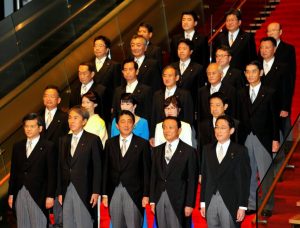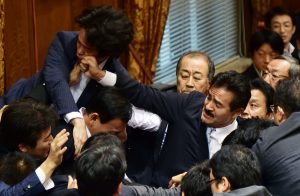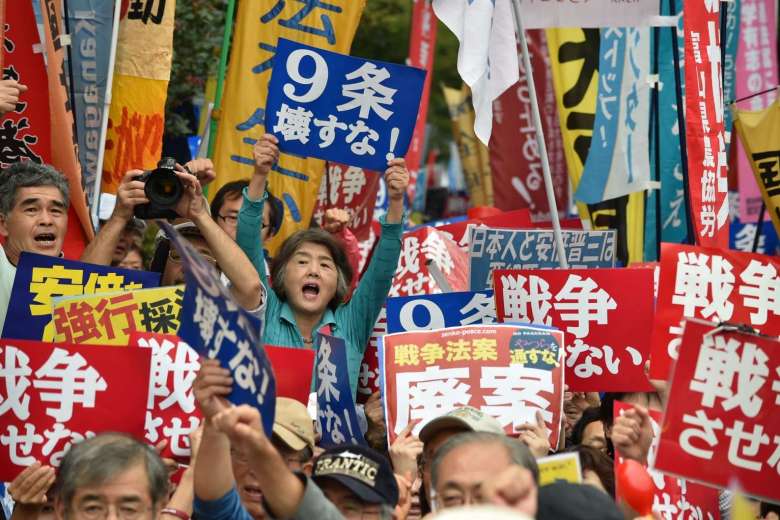“Aspiring sincerely to an international peace based on justice and order, the Japanese people forever renounce war as a sovereign right of the nation and the threat or use of force as means of settling international disputes. In order to accomplish the aim of the preceding paragraph, land, sea, and air forces, as well as other war potential, will never be maintained. The right of belligerency of the state will not be recognized.”
-Article 9 of the Constitution of Japan
The above passage has defined much of Japan’s postwar military history. Once the dominant military power of East Asia headed by an autocratic Emperor, Japan after World War II was forced under the US Occupation from 1946 to 1952 to relinquish not only its ill-gotten territories in East Asia but also its once mighty military. During that time, a new Japanese constitution, one which stripped the emperor of his power and created a parliamentary democracy, was drafted by American and Japanese officials and enacted in 1947. Since that year pacifism has been a guiding principle of Japanese foreign policy. Despite the lack of “normalcy” due to diminished sovereignty over its military affairs which bothers the right-leaning legislature, many Japanese still see the value in remaining pacifist as their parents as well as grandparents and if need be would vote down any potential amendments to the Constitution rejecting pacifism.
But politics in Japan tell a different story. Since Prime Minister Shinzo Abe and his ironically named right-wing Liberal Democratic Party (LDP) decisively returned to power in 2012 they have emphasized the importance of security in the face of a more assertive China. Abe has pushed for revising the constitution, specifically Article 9, to allow for Japan to maintain and deploy its own military forces at will. While the Japan-U.S. Security Treaty and its own domestic Self Defense Forces (SDF) provide limited protection, many Japanese are worried that Japan is increasingly defenseless compared to China and want a fully empowered military. One man visiting a cemetery for unidentified soldiers on the 71st anniversary of Japan’s surrender states rather frankly that the Constitution is “wonderful and has noble content, but we can’t trust the surrounding countries.” He echoes the sentiments of many Japanese who do not wish to return to Japan’s imperialist past but want the capacity to stand up to potential aggressors in the region.

Many conservative Japanese also see the Constitution as something forced on Japan by the United States. Vice President Joe Biden recently bolstered this idea when he stated that the U.S. “wrote the Japanese Constitution” to prevent Japan from becoming a nuclear power. While many on the left decried the statements as insensitive, others on the right felt validated by Biden’s remarks and will likely use them as ammunition when debating the merits of amending the Constitution in the National Diet.
This summer Abe’s LDP and three other amendment-supporting parties won enough seats in the upper House of Councillors to have a supermajority, a key step towards revising the Constitution. A Constitutional amendment requires two-thirds of both chambers to vote in favor of it and the LDP already enjoyed a supermajority in the lower House of Representatives so winning the upper house election was the logical next step for the LDP. Despite focusing on the economy and his “Abenomics” policies during and after the campaign, many suspect Abe is still pushing hard for the amendment behind the scenes as evidenced by his appointment of notable revisionist and war hawk Tomomi Inada as his Minister of Defense. She is known for her inflammatory statements denying Japan’s responsibility for World War II crimes and visits to the controversial Yasukuni Shrine, actions condemned by both China and South Korea. Furthermore, as a rising star in the LDP, many fear that Inada may replace Shinzo Abe as Prime Minister in 2018 if the LDP continues to gain support. Abe, who stated that it his “duty” as LDP leader to revise the Constitution, only has about two years to follow through on that promise but there is little doubt that if Abe fails Inada will push harder for revision if she becomes PM.
Although no formal amendment has been tabled or debated in the National Diet up to this point, Abe and the LDP have gradually been taking measures to beef up Japan’s national defense since 2012. On the domestic level, Abe pushed a motion through the Diet in 2014 which allowed for the SDF to be deployed overseas for so-called “collective self-defense,” meaning that troops could be deployed to allied countries if they are attacked by a common enemy. This was followed by a motion passed in September 2015 that allows Japan’s military to fight on foreign soil for the first time since World War II; not surprisingly, this motion passed through the House of Councillors amid massive public protests and even physical altercations among members of the chamber. SDF troops are currently being trained to conduct rescue and escort missions as part of UN peacekeeping operations in South Sudan, perhaps the first of more deployments of SDF troops overseas in the future. More recently, the Japanese Ministry of Defense’s annual white paper condemned China’s incursions into Japanese territorial waters and airspace around the disputed Senkaku Islands while also stressing that the security environment around Japan has become “increasingly severe.” It states that “enforcing the legislation [i.e. amending the Constitution] to ensure and contribute to peace and stability…is more important than ever.” Additionally, Japan has signed defense treaties with both Vietnam and the Philippines to counteract China’s blatant disregard of international law in the South China Sea. While such pacts may have been signed even in the absence of calls for constitutional reform, they are indicative of how important the region’s security is to the LDP and why many Japanese see revision as necessary to counter China’s belligerence.

Abe and the LDP face one crucial obstacle to amending of the Constitution: the people. While many Japanese citizens are fearful of hostile states like China and North Korea, or feel that the Japanese should write their own constitution, a poll conducted in June 2016 found that only twenty-six percent of voters support revising the Constitution and less than half of those voters feel that revision is a priority. A majority of Japanese voters outright oppose amending the Constitution. Many Japanese are well aware of the price of war due to reminders like the Hiroshima Peace Memorial Park or the stories of their relatives who either fought or suffered losses in the war. Even Akihito, the Emperor of Japan who is obliged to remain apolitical, has warned Abe and the LDP to “proceed carefully” before altering the Constitution. He encouraged Japanese citizens to respect the Emperor as nothing but a figurehead and learn from the mistakes of the past. Naturally these comments irked many conservatives in Japan who refuse to acknowledge Japan’s crimes and wish to return to the days when the Emperor was deified by the people. Because constitutional amendments must be approved in a national referendum following votes in both of the Diet chambers, gaining public support remains an issue for Abe and the LDP. As much of a threat as China appears to be, many Japanese do not buy into the fearmongering of the LDP and would rather the government focus its effort on the economy and the low birth rate instead of making revisions and potentially picking fights with its neighbors. While the spirit of pacifism has been instilled in Japanese citizens for generations, the LDP is just one referendum away from altering Japan’s foreign policy permanently.


